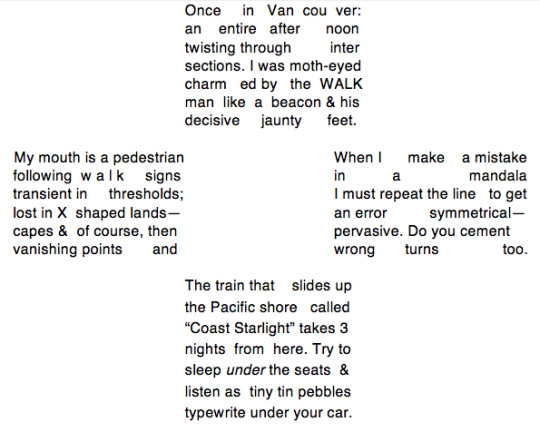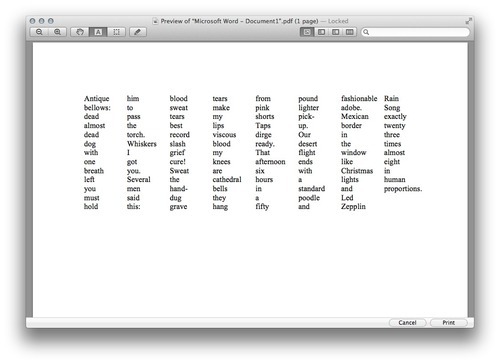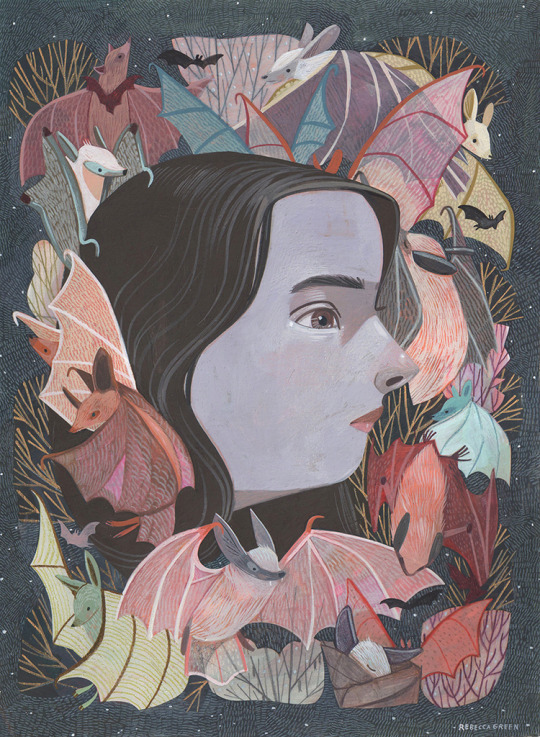Text
To fall in love is to create a religion that has a fallible god.
— JORGE LUIS BORGES, Other Inquisitions.
12K notes
·
View notes
Text
Carsickness
The road from Rioja to Tarapoto
was built in 2000- says the taxista.
-No, I’ve never been carsick- Before
it took 6 hours, 9 when it was rain
In an astonishing sloshy 2, the road
falls in on itself. Beyond the detour
two dogs, one deflated. Pink leash
still limp around its neck. Its white
companion stands guard. And I don’t
know how I know it is dead, but
in an instant, the deadliness of it
strikes the liveliness in me like
equilibrium, and then again it was
an empty window. In the shoulder,
a horse. Its tail reaches up and tugs
on its ribs. We’re swerving around
the bird, burst open like a bag
of seeds. Finally a curled body
skittering still across the median. I
gasp. but it’s a only leaf. In the next
seat over, Alejandra sleeps. Ayer,
la durmimos, she breathes. Mañana,
she will learn how the new puppy
scratched at the fresh garden grave
until her sister covered it with something
more durable. After a few hours, he could
hardly remember why he’d been outside.
2 notes
·
View notes
Text
Down Avenida Benavides
In my head, I’ve started to tell you
how rain in the headlights of Lima’s
oncoming traffic looks like little gnats
so slight they don’t wet my sweater
when you say, yeah, yeah, yeah,
we get it Paulina. Things are like
other things. And in my head,
I’ve let myself down, and though
I don’t know who you are, well, is
you know I have failed again
to write about home. Maybe you can
also tell me what use I can make
of a set of half-developed skills.
2 notes
·
View notes
Photo

L'heureux donateur (The Happy Donor) by René Magritte, 1966. Oil on canvas. Musée d'Ixelles, Brussels, Belgium.
4K notes
·
View notes
Text
I am uncomfortable and cattle
The sun liquifies over Smith Rock
Unscientifically the water is golder than the light.
Sisters, my climb shakes
The back of my hands ache from looking at them.
Sisters, I am uncomfortable and cattle
roped in eight seconds flat
The padded pastures are on the wrong side
of the rocks; they're too hot
Middle sister, center of gravity, where are you now?
1 note
·
View note
Text
Breakfast Poem II
In this dream I help him
sell his knockoff Columbia
jackets for retail on Ebay.
With my advertorial English
and his mysterious coats,
the sham is unreal.
In another dream, I give
the man all the money for
an olympic philanthropy medal.
The press cheers us on
what a good job of lying
we did on the internet.
"And everyone won" They'll
conclude happily, meaning
the public got their logo
the man folded his blanket,
quit smoking and moved his family
to a nice suburban house in the hills.
2 notes
·
View notes
Text
PHX --> SCL
I check in and I think
I am not truly living
a monastic life until I have lost
my baggage or claims,
returned to myself
a half-empty backpack, importantly so:
I can throw out
the other shoe too
on the shimmering concrete
like a pair of fried eggs,
meager, yes.
If I wanted to do it right,
I wouldn't have brought so much
shit to begin with but here
we are. Loss now
unavoidable and inevitable, this great
migraiton before us.
1 note
·
View note
Text
Things my mother says.
Girl finds rocks in her poems. Has no idea how they got there. Turns out mom refunded a geology degree a few jobs before she was born.
Not now but 27 years ago
as the crow flies, I suppose,
I sense you mother moving
like a static-ish shadow
or the sound just before
an echo that goes and so on.
Vague, obscure
The originial a much lower
fi. It's a good deal you say
It's a good Diehl now I call
across the chasm of Intel.
25 year old she doesn't
know what I'm talking about
or doesn't hear me. Once
I thought about a divided
book with our two narratives
on a reflection page. How
similar were our hims. How
likely our two discarded hymnals
(Grandma lost her place
when you unlearned to
crochet.) Oh, you knew. See
the byline. How like me
then-you was. Then-me thinks
that's horrifying. Now-me
thinks that's too funny Zen-me thinks
3 notes
·
View notes
Note
"The appreciation of up demands the existence of down" -- This sounds dangerously close to a statement about the existences of chocolate and broccoli.
I think they say very different, if not opposite things. To say “that the existence of broccoli does not, in any way, affect the taste of chocolate,” is to say that the quality of one thing is neither enhanced nor negated by opposite qualities of another. To say that the appreciation of up demands the existence of down is to claim otherwise: that without down, up would simply be a point on a plane or state of mind with nowhere to go. Although comparisons are odious, as Jack Kerouac would put it, I’m going to have to argue against John Green on this one and say that comparisons are unavoidable, and sometimes necessary, and that a broad analogy that seeks to simplify an abstract concept can be just as odious as the comparison he attempts to deconstruct.
0 notes
Text
SUCH AXIOMS
A rabbit: fat, orange, and quite the philosopher:
every evening he hops over to the window,
watches the sunset in silence awhile, hops back.
The sunset, which is not the sun at all actually, but
the light just near the juniper bushes— It being yellow
as he stares at them and orange only when he lookes away.
“When people ask me about myself, I know to tell
a collection of contradictions such that as I summarize
I say one true thing and mean the exact opposite.
The peaceful existence between two axioms will never
be explained. How often does the same grass taste either
like bitter cellulose or chlorophyll? Such ineffability
cannot be cured.”
#poems#poetry#what is this#creative writing#spilled ink#twc#free verse#philosophy#rabbit food meditation?
2 notes
·
View notes
Text
She who sings prays twice
Every Wednesday morning: the sliding door of a maroon minivan. Jumping out of the car in a plaid skirt and polo. Icy breath protesting the early hour before school started. The warming of hands. The singing of scales. Friday afternoon: standing in front of the student congregation. Swaying through communion songs, the sweet, simple melodies of psalms. These gentle routines guided me the first times I sang to God. As a ten-year-old member of the church choir, I got to leave class early to unlock the thick wooden doors of the cathedral and set up for mass. The robes were hidden in a hall behind the altar. The songbooks and microphones in boxes were stacked in a brown cabinet with flaking gold paint by the piano. As a cantor, I sang a chorus to the congregation alone, and they sang it to back to me. The great stone steps made me feel an intercessor, translating the conversation between the human and the holy.
My adolescent faith was played out in shag carpet living rooms late at night. I still led conversations like cantor psalms, sitting in circles with my closest girlfriends. Stacks of Seventeen, whose horoscopes whispered to us from the back cover, and bottles of nail polish sat like incense at our feet as we contemplated the forces that moved us. For every argument there was a response with a correctly-cited bible verse. I led a middle school youth group in worship nights. I offered my congregation a steel chalice of bitter red wine.
Then the crowded hallways of public high school swallowed me whole. Meaning, I became a part of them. I wore no robe for distinction. I no longer had the metal cross of a music minister. Who could I sing to, if I had no congregation to respond?
I lost god somewhere between sophomore year and reading Siddhartha. I never called it atheism, but rather, “I guess Catholicism doesn’t give its god figure enough credit for me.” I felt as though I had found Him to be much more than I bargained for, not at all someone with whom I could converse. It wasn’t enough to have created the universe; to me, a god had to be the universe. For me, the Christian God was only one facet of deity, a relationship defined by call-and-response rather than omnipresence. I found a god I couldn’t look at and didn’t fit inside my living room.
Still some ancient tradition was calling to me. I missed the ritual of the mass. I missed the tug of dusty medieval phrases, thousands of years old. There is something to be said for repetition-- a room full of voices not only speaking in unison but also believing and feeling together. I missed the familiarity of a melody that guessed itself, a reliable arc of music, a prayer a whole room could know.
Then, in the middle of college, I was invited by a Catholic friend to sing in a community chorale. Which is to say, a choir with a lot of retired folks. We sang pieces penned when the Church sponsored music: Mass in G, Sanctus Deus, everything in Latin. Singing those songs was like holding a needle to vinyl prayers. Trodding my maternal alto line, I felt solidarity with every singer in every cathedral who had sung the same notes before me. I was no longer in front of, I was among. It didn’t matter whom I was singing to; what was important to me was that people were still singing it, the mass, all over the world. Even when I was away. I joined choir to be closer to God. Let’s say I joined again to find him.
*
It is Monday evening, and we’re sitting in a church. We’re sitting in a beautiful church with stained glass and a vaulted ceiling. The pews are empty, but ninety-eight voices fill the area where the altar has been pushed aside; people who have seen the wars, people who were alive to make vacuums a common household appliance, people who have never missed a Sunday mass. Our young conductor stands in front of us, his admonitions to listen more carefully, elongate our vowels, and stagger our breathing oddly technical, yet somehow intimate in the yellow light of a church after hours.
The piece we are singing, Maurice Duruflè’s Requiem, is divided into nine sections- a musical translation of a funeral mass. Completed in 1947 in France, a country still reeling in broken bricks and loss, Durufle’s Requiem is the firstto feature the peaceful Pie Jesu as its centerpiece, foregoing the fire-and-brimstone dramatic stylings of Requiems past. The piece begins slowly, mimicking fourth century Gregorian chant.
Introit. The piece changes time signatures five times on the first page. The rhythm is intentionally confusing, intended to encourage choir members to listen louder than they sing. We watch carefully for the barest lift of our conductor’s fingers and we tap our palms on our blue jeans. We trust each other, not the book, to move the music.
Agnus Dei. The sixth movement. Above the word sempiternam, (eternity?), Duruflé has written perdendosi, a directional note to the choir in Italian. It means we hold our note until we have no breath left, each voice drops out on its own time until the choir has obtained silence. Literally, it loses itself.
Morte aeterna. At the end of the penultimate movement, the bass line echoes and the organ pedal lifts with a chnk that could be a coffin falling to wet earth. It could be monks. It could be me. Silence for a measure. Then a soprano slowly.
sum te deducant te Angeli…
di
para
In
Imagine the notes filling a sunlit glass vase, dust motes, hourglass, narrow and ethereal, then all at once lifting, spilling into the hollow arches of the church. There is no way to explain the relief earned when a measure of discordant minor seconds has passed. There is no way to explain what its like to end a fifty minute piece on a dominant ninth. This is one conversation that is untranslatable.
*
I’ve regained the sense of mystery I lost with my first circuit through the faith. I am singing in a dead language, following key signatures and times I’ve never heard of. I’ve yet to translate the words we are singing, for fear of tainting this transcendence with the cerebral. For now, I’m content to obtain meaning from the way the music sounds and the few words I recognize that have danced their way down into modern English. To sing them is enough.
When I think about moments in my faith marked by mysticism, I remember a retreat I attended as a teenager with two thousand other Catholic youth. We took over a college campus for one July weekend in Tucson; musty dorm rooms with white brick walls became confessionals, the slick new student union-- all neon and fast food-- our daily bread. On Saturday night, the auditorium was our cathedral. Its stage a modified altar where the consecrated body of Christ rested in a golden frame on a simple table. As we sat in the darkened concert hall, clouded and sang the Latin adoration, tantum ergo sacramentum, veneremur cernui, I watched goose bumps rise on the neck of the person in front of me.
I have never been a solo singer. Much as I would have loved a voice suited for hazy acoustic covers and late night camp talent shows, on its own, my voice is about as lyrical as a plastic Yahama recorder. Yet I have mastered the art of blending with those around me. I allow my own humble offering to be cared for and carried by the stronger voices. The moments I felt closest to God were not the times I was leading the song as a cantor in elementary school, nor were they in the religious or philosophical debates that followed. I found spirituality in the moments I lost myself. I believe in unity. I believe in eternal life in the sense that a serpentine timeline of humans can be connected by a singular piece of music centuries old. I believe in becoming one.
In choral singing, an overtone is created when multiple voices sing different strains of one chord so in tune that, by way of resonance, there emerges a higher, unsung but still audible note floating above the voices. There are several opportunities in Duruflé’s Requiem for an overtone. I imagine it shooting from the middle of our choir like a glowing wellspring of holy water. For me, that note is divine.
2 notes
·
View notes
Text
And I wonder why we didn't sail off on it
Today who am I came home to find a cherry
Beemer in her driveway, walked past with
only the barest hint of red alarm. She undid
the door, set to spin a Joan Baez record
and made two half rounds of spaghetti.
Later, the same laid on the couch to read
Hopscotch (the best first chapter). A cat on
her chest gently licked tears from her peach
colored lips, both marveled at the sheer
beauty of such small things.
Outside, someone, a gentleman?,
curled into the car and drove away-- A most
luxurious cloud of soft muffled noises.
1 note
·
View note
Photo

3 notes
·
View notes
Text
On learning historical family secrets
Last month on the news Bill
Nye and Ken Ham went at it.
Or so I heard. Someone should
have mentioned if Ham’s
shirt was starched with sweat
by the end and where was Bill’s
felt hat?
Only just now I learned
My step father plays creationism
on an electric bass, subtle and full
of demands. But I already knew he played
Lighthouse radio inside the bullet
he rides like a commute at night
and prayed for me inside my own house.
My mother and I, we occupy
the versus. The only women
these men mutually love —
Madonnas with brown braids
and sharp noses and a certain
brand of shoulder shrug.
My father, evolution, slow millions
of years, knows limestone lines
and history. The man reads biographies
lives in an an ancient clay compound
all war paint & broken signs. Get high
look out on the expanse of biblical
clouds and be amazed.
1 note
·
View note
Text
THIS POEM IS TE_R_BLE ( A collaboration with Ben Whitely)
THIS POEM IS TE_R_BLE!
Go on. Take it in your hands
Get reeal close. I mean really
look at it. Doesn't it seem te_r_ble
to you? We both know, you and I
know that you're no art critic,
but the nature of this poem hardly demands it
This poem is so te_r_ble you can feel it
in the ink, you can bend it in your palms.
It's ok to agree with me.
If you accuse this poem of being te_r_ble,
we are not conflated.
(Take this with you everywhere, by the way.
A person is not her art.
A person is not his art.)
Hehehe. Happy Spring Break everyone. If you're not on spring break, take one! Break for the woods and the beaches. Break for your bedroom. Break for the morning and the night. I'll be breaking for Flagstaff and banjos and creeks.
xoxo
1 note
·
View note
Text
Skeleton story

3 notes
·
View notes


